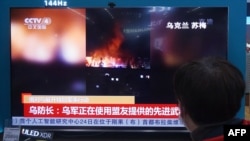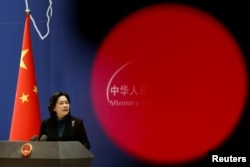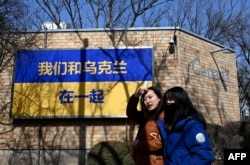A one-minute video of Chinese Foreign Ministry spokesperson Hua Chunying urging peace in Ukraine has racked up some 19,100 likes on her country's popular WeChat social media service. In the clip, she makes a single comment: "If you see two people arguing and about to fight, do you give them weapons or first help them to work it out and find out what happened before? I think the concept is very simple."
Hua's comment came from a ministry news conference last week after Russian troops entered Ukraine on February 24. It was picked up by the state-run China Central Television website and viewers spread it onward to WeChat. It is an example of how Beijing's messaging machine works.
The spokesperson's comment and its migration from traditional to social media are also typical of how Ukraine-related news has flowed in China over the past 10 days, analysts say.
The state-run mass media and state-monitored social media are restricting war coverage as part of China's effort at making peace and backing Russia's right to defend its interests, observers say. They are using Russia's label for the war, "special military operation," instead of the term "invasion," which is common in the West. Analysts say domestic media have been given specific orders about how to portray the conflict.
Mass media within China was ordered on the war's first day not to cover news disadvantageous to Russia, Radio Free Asia reports.
Social media outlets in China are also censoring content, said Yaqiu Wang, New York-based senior China researcher with the advocacy group Human Rights Watch.
New story, same media controls
Coverage of Ukraine reflects China's way of controlling its media since the late 1990s, when the internet became a tool of the public, experts say. China has blocked selected websites, ordered certain content to be removed and asked mainstream media to cover stories according to strict guidelines for keeping social order at home and sustaining public confidence in Beijing's Communist leadership.
Social media are blocking anyone who talks of organizing war-related protests, for any cause, and stopping posts that include vulgar and sexual comments about Ukrainian women.
"What they are censoring is changing and the kind of propaganda they are pushing out is changing," Wang said, referring to the newness of Ukraine-driven content. But she said that "in terms of methods, the level or control, the way they control has not changed. It's just the content that's changing."
Communist Party personnel continue to manage the media according to a "fixed" structure "as an important pushout for the narrative," said James Gomez, regional director of the Bangkok-based Asia Centre think tank.
"Given that there has been a fragmentation with the rise of social media, especially within China, those narratives are being pushed out through the new platforms such as social media. It is the same news but just consumed over different platforms and different bite sizes," he said.
Support for Russia?
Chinese media have stressed China's assertion to "neutrality" in the conflict and downplayed the "importance" of the Ukraine story by shifting focus to domestic issues, said Alexander Vuving, a professor at the Daniel K. Inouye Asia-Pacific Center for Security Studies, in Hawaii.
"Chinese media appear to be banned from using the word 'war' or 'invasion,' so they have to use the official Russian definition of that, which is a 'special military operation,'" he added.
Sino-Russian ties have grown closer over the past year, but China positioned itself this week as a mediator between war-divided Russia and Ukraine rather than a backer of Moscow.
"As far as I can tell, people around me are paying attention mainly to the Russia-Ukraine situation's progress and the incident's impact on global politics and economics," a Beijing-born WeChat user told VOA last week. He does not want to be named in case the comment attracts Chinese internet censors.
Traditional media meet social media
Like the ministry spokesperson's comment about peace, war-related content often migrates quickly from news websites onto WeChat, Tik Tok and Weibo microblogs – outlets that are based in China where authorities can scan content for keywords.
In the social media space, after actor Louis Liu had joined an anti-war protest in Los Angeles, his photos on a Weibo page were removed after garnering 3.4 million views and 20,000 likes, VOA's Mandarin service reported.
China's censors have allowed pro-humanitarian Ukrainian posts to stay on social media. Another Chinese man's one-minute video plea for greater understanding of Ukraine's history and economic influence posted March 2 to WeChat picked up 39,400 likes and has not been taken down. It talks about how the scale of Ukraine's economy compares to Guangdong province's economy, a business hub for China, the video says. The Ukrainian-friendly spot includes one image of a missile soaring through the air and the sound of a child crying.
China's state-run English language cable news service, CGTN television and web media, are putting out short news items about the war expressly to let social media redistribute the stories, Asia Centre's Gomez said. On Monday, for example, CGTN carried small blurbs about Ukraine-Russia negotiations and the growing number of war refugees, similar to news consumed outside China.
CGTN however, among other Chinese media, also ran stories on their news homepages Monday about Russia declaring a list of "unfriendly" countries and regions, including the United States.
Most news websites led with statements from the National People's Congress, a congressional-style body that's meeting this month in Beijing, along with images from the Paralympics that opened last week in China.


